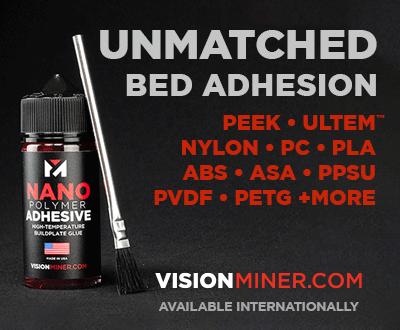The Top Compact, Industrial FDM 3D Printers
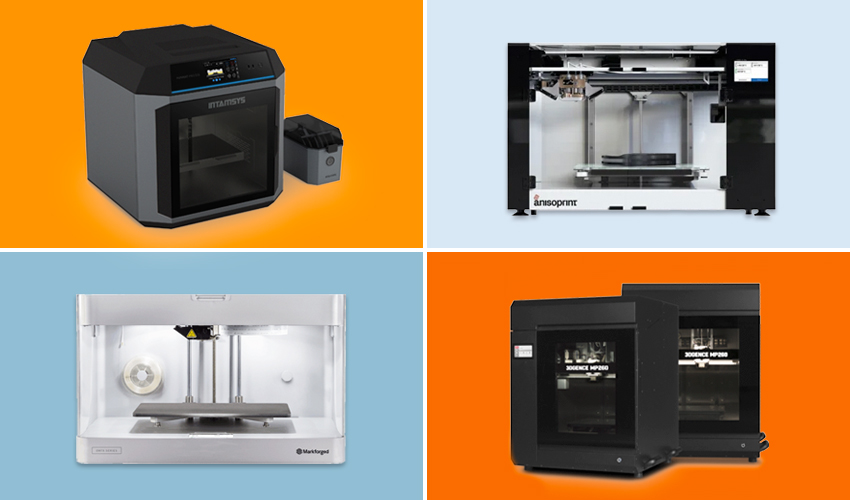
Despite the growth in other additive manufacturing technologies in other years, fused deposition modeling continues to dominate a large share of the market. This can be seen not only with a corresponding rise in commercial, lower-cost solutions in recent years, but also in the presence of more large-format, industrial printers for high-performance applications. But what about if you are looking for industrial-grade performance in a more manageable size? To address this need, more and more manufacturers are creating compact, industrial FDM 3D printers, meaning systems that are compatible with high-performance materials such as high-temperature polymers or even metals but still small enough to fit in an office environment. We took a closer look at some of the most exciting solutions currently available, in no particular order.
The Compact Industrial 3D Printer From INTAMSYS, the FUNMAT PRO 310
One of the leaders in high-temperature and high-performance FDM 3D printing solutions, including desktop solutions is INTAMSYS. Take, for example, the FUNMAT PRO 310. With a build volume of 305 x 260 x 260 mm, it was conceived as a way to “bring industrial performance to desktop 3D printing in order to respond to the growing demands of professional engineers.”
As such, the FUNMAT PRO 310 3D printer has a number of interesting features for industrial FDM 3D printing. For example, it is compatible with engineering materials, including PC and ABS, thanks to active heating thermostatic chamber with uniform temperature distribution up to 100℃. Furthermore, for ease of printing, characteristics like intelligent multi-point mesh automatic leveling and real-time compensation for motion accuracy are also key characteristics. The FUNMAT PRO 310 3D printer is available from $8,495/€7,999, find out more HERE.
The E2CF printer from Raise 3D
The E2CF is a versatile, compact, industrial 3D printer designed for manufacturing and prototyping. As an IDEX (Independent Dual Extrusion) system, it has extruders that can work independently along the same axis, offering advanced functionalities. Using FDM/FFF technology and specially optimized for 3D printing of carbon-fiber-reinforced filaments, it finds applications in fields as diverse as aerospace, automotive, medical, sports equipment and many more. Indeed, this printer is compatible with a wide range of materials, including PLA, ABS, Nylon, PET, PPS, fiber-reinforced PETG and other technical thermoplastic filaments. With dimensions of 607 x 596 x 495 mm, it offers numerous features such as a depleted filament sensor, print heads that are easy to remove for replacement, and a camera to monitor the entire 3D printing process.
The Markforged Onyx Pro, a Desktop Composite FFF 3D Printer
Markforged’s Onyx Pro is one of the company’s compact, industrial, composite 3D printers. Engineered with a sturdy chassis and precision components, this printer utilizes continuous fiber reinforcement technology to produce fiberglass-reinforced thermoplastic parts with exceptional strength, reportedly ten times stronger than traditional printing plastics. With a substantial build volume of 320 x 132 x 154 mm, the Onyx Pro accommodates various printing projects, from small prototypes to larger components. Its second-generation extruder and kinematic coupling print bed help to ensure consistent and accurate printing results, contributing to its reputation for reliability. Additionally, the Onyx Pro caters to a diverse range of printing needs, as it offers printing compatibility with multiple materials such as Onyx, Precise PLA, Smooth TPU 95A, and fiberglass. Though the solution has been mired in controvery in recent months as it is one the printers named in an IP case against Markforged.
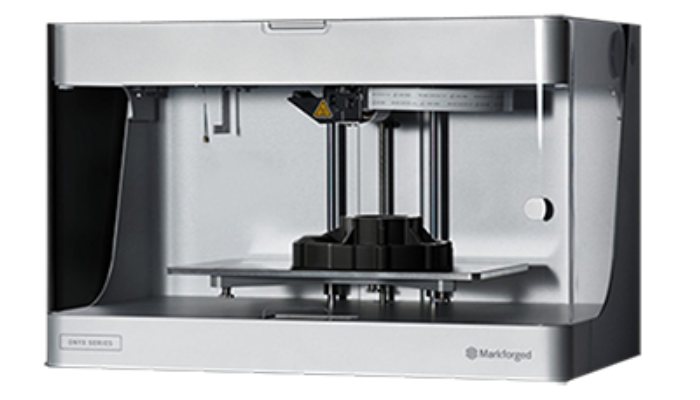
Photo Credits: Markforged
The UltiMaker Method XL, a Compact and Industrial for Precision 3D Printing
The UltiMaker Method XL is an ideal printer for the production of technical prototypes made of ABS. Even on a large scale, it can be used to produce detailed and precise pieces with tight tolerances. Its build volume of 305 x 305 x 320 mm enables the production of large prototypes, which can then be subjected to various tests. The flexibly heated build plate (heatable up to 105°) and the chamber (heatable up to 100°) also contribute to the printing result, as this improves the adhesion of the print layers. Dual extrusion allows geometrically complex parts to be printed on the UltiMaker Method XL by extruding ABS filament and a water-soluble support material. A built-in HEBA filter, which improves air quality, ensures better user-friendliness.
The Epsilon W50 SC From BCN3D
The Epsilon W50 SC by BCN3D is a versatile, professional 3D printing solution designed to produce large parts with industrial-grade materials. Integrated with features like a passive heated chamber and Smart Cabinet capability for a humidity-controlled environment, it ensures optimal conditions for consistent and reliable prints. Additionally, it can deliver high-strength, functional parts with precision and quality thruoghj its Independent Dual Extruder system. The Epsilon W50SC boasts a substantial build volume of 50 liters (420 x 300 x 400 mm), offering ample space to accommodate various project requirements, making it suitable for diverse industries and applications. With a selection of materials developed by industry-leading companies like BASF and Mitsubishi Chemical, along with support for third-party materials and filament packs, users have the freedom to explore a wide range of technical applications.
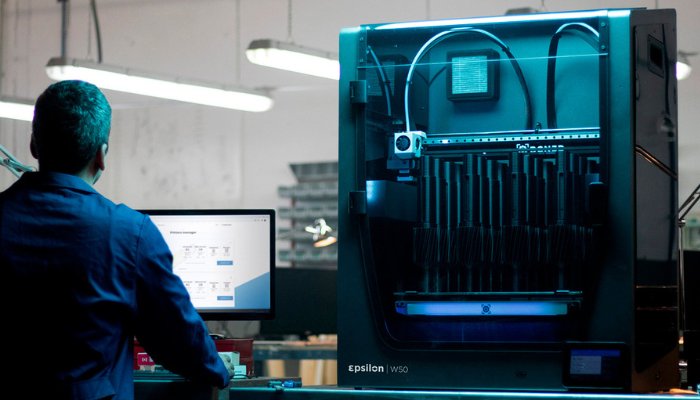
Photo Credits: Epsilon W50
Anisoprint A4, the Compact, Industrial, Composite 3D Printer From the Company
The Anisoprint A4 3D printer is one of the compact, industrial continuous fiber FFF 3D printers from the company. The technology used is co-extrusion, which allows the deposition of the polymer matrix and fiber with two separate nozzles. The A4 version has a size of 297х210х140mm, but the machine also exists in a slightly larger A3 version. In addition, the Anisoprint A4 features an open system ensuring a flexible choice of materials. The built-in slicing software, AURA, has a number of built-in print profiles for certain filaments to choose from to start printing right away.
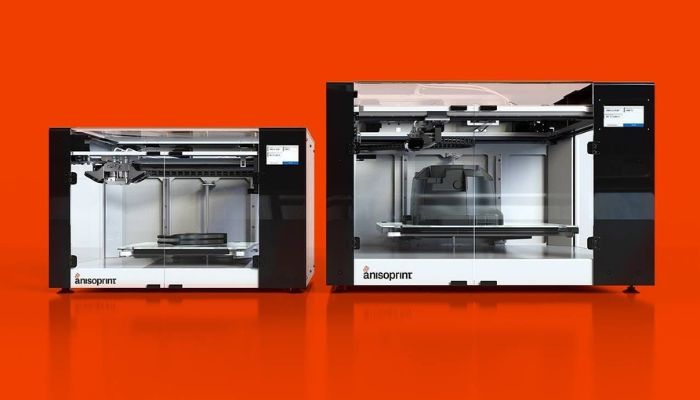
The Anisoprint A4 (left) and A3 (right) machine (photo credits: Anisoprint)
Zortrax M200 Plus 3D Printer
The Zortrax M200 Plus 3D printer has been developed by the Polish manufacturer of the same name. This Plug & Play machine offers a print volume of 200 x 200 x 180 mm and a resolution of between 90 and 390 microns. Equipped with a heating plate that can reach 105°C, this FDM 3D printer is compatible with a wide variety of thermoplastics – although only filaments from Zortrax will work, as well as ABS Ultrafuse from BASF and PC-ABS from Nanovia. In terms of applications, the Zortrax M200 Plus is ideal for designing functional prototypes, medical parts and automotive and aerospace components. Last but not least, the 3D printer is equipped with a Speed Mode feature that accelerates the machine’s speed: it is said to be able to go 3 times faster!
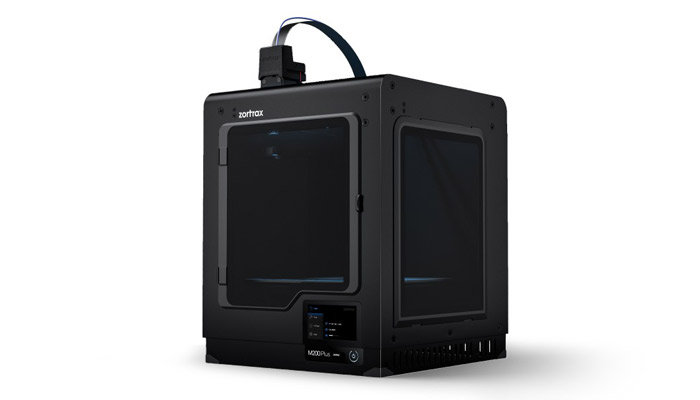
Photo Credits: Zortrax
The Omni200 CF, the Solution That Is Compatible With Most Filaments
Another Polish manufacturer on the list, OMNI3D is well-known for its large-format, high-performance 3D printers. But did you know the company also has more compact 3D printing solutions? Take the Omni200 CF 3D printer. Designed as a “Desktop printer for customers requiring…industrial standards of printing,” the Omni200 CF has a more compact build volume of 200 x 200 x 200 mm, but boasts other features that enable industrial FFF 3D printing. For example, a nozzle with a maximum operating temperature of 400°C and a platform temperature of 120°C, allowing printing with most engineering filaments as well as composite materials. The printer also has remote management, is compatible with 3MF, OBJ and STL files and has a removable magnetic pad with high flexibility for easy removal of prints.
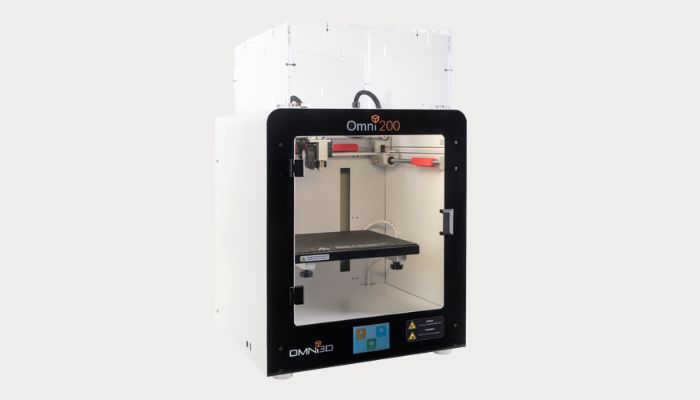
Photo Credits: OMNI3D
The Studio System 2 Compact Metal 3D Printer from Desktop Metal
The Studio System 2 3D printer by Desktop Metal presents a novel approach to both FDM and metal 3D printing, transcending traditional laser-based systems with its Bound Metal Deposition technology. This approach prioritizes safety by extruding bound metal rods, while also enabling features like fully closed-cell infill, leading to lightweight yet durable final parts. Its user-centric design includes features such as a heated build chamber and dual quick-release print heads, enhancing efficiency and promoting consistent part quality across diverse and complex geometries. Furthermore, printing is made safe and easy with its auto-integrated Live Studio software, which automates all steps in the production process for both printing and sintering. With a spacious build volume of 300 x 200 x 200 mm and compatibility with most file formats, the Studio System 2 stands as a compact, industrial 3D printer for a variety of metal applications.
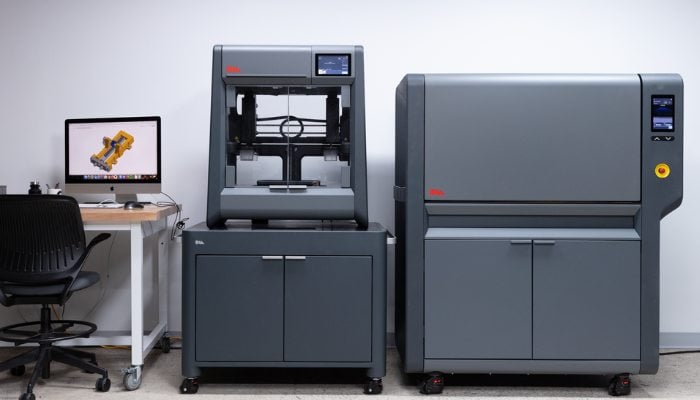
Photo Credits: Desktop Metal
CreatBot F430
The CreaBot F430 is a versatile compact, industrial FDM 3D printer designed for a multitude of applications, from design to prototyping and the production of high-performance materials. With a generous build volume of 400 x 300 x 300 mm, it is compatible with a wide range of filaments, from consumer (PLA, ABS, PETG, PVA…) to industrial materials (UltraPA, PA-CF, PA-CF…) and high-performance thermoplastics (PEEK, PPS…). Precise printing down to 0.04 mm guarantees stable filament extrusion without obstructions. What’s more, its heated platen (up to 140°C) and chamber (up to 70°C) contribute to high-quality printing results.
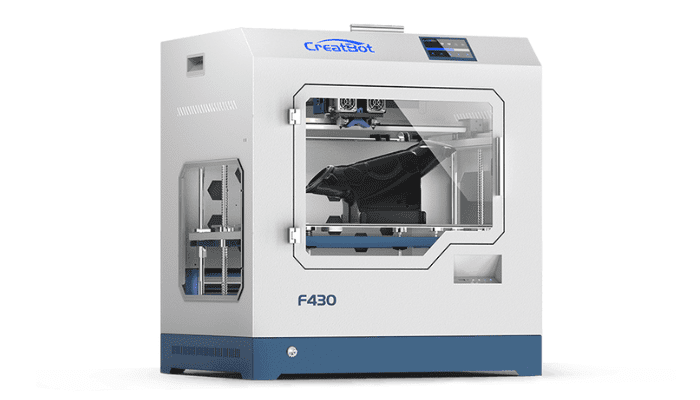
Photo Credits: CreaBot
Roboze Plus PRO Industrial 3D Printer
The Roboze Plus PRO 3D printer is one of the company’s compact, industrial FDM 3D printer that processes a wide variety of high-performance polymers. These include aesthetic materials such as ULTRA-PLA and ABS, flexible materials such as FLEX-TPU, to super polymers such as PEEK, PEKK, ToolingX CF, and Carbon PEEK. The machine design is quite compact with a size of 790 x (Y) 690 x (Z) 1910 mm. The printing table, has a volume of 300 x 250 x 220 mm (xyz) and reaches temperatures up to 150°C, which, together with vacuum technology, ensures stability and adhesion of printed components throughout the process. In terms of precision, the Roboze Plus PRO guarantees a 3D printing accuracy of 15 microns. Finally, the machine is equipped with the HT Dryer device, whose function is to prepare the material before 3D printing by drying and heating it, thus ensuring surface quality and mechanical performance of the parts produced.
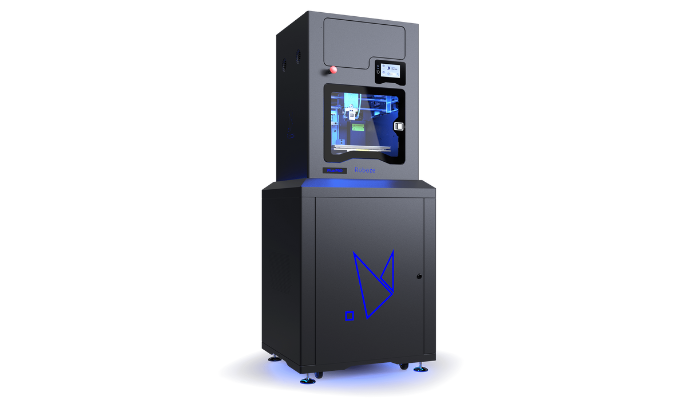
Photo Credits: Roboze
3DGence’s Metal FFF Offering, the ELEMENT MP260
Polish company 3DGence is best known for its large-format 3D printers that are adapted to high-temperature polymers. But did you know that the company also has compact metal solution? 3DGence’s metal, compact industrial FFF 3D printers, named ELEMENT, were launched at Formnext 2021 and though not much information has come out since then, the MP260 was launched in December of that same year. This smaller solution (with a build volume of 260 × 260 × 200 mm) has been designed as a cost-effective prototyping printer for MIM production and uses 3DGence’s metal deposition modeling (MDM) technology. The printer is compatible with two materials, including 316L Stainless Steel.
What do you think of this list of compact, industrial 3D printers? Were there any we forgot? Let us know in a comment below or on our LinkedIn, Facebook, and Twitter pages! Don’t forget to sign up for our free weekly newsletter here, the latest 3D printing news straight to your inbox! You can also find all our videos on our YouTube channel.







